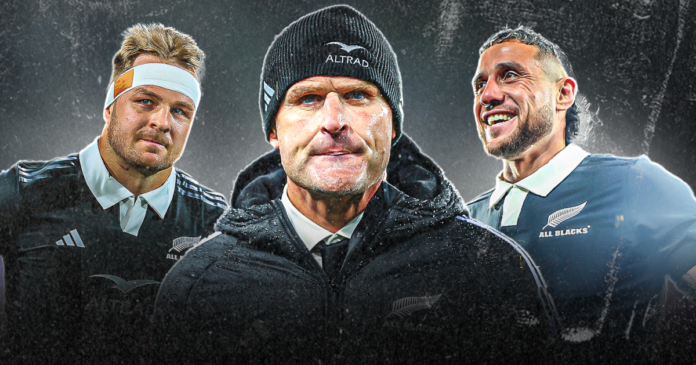
[ad_1]
There is a whiff of desperation coming off the All Blacks as they ready themselves for their last five Tests of the year.
Their squad to face Japan, England, Ireland, France and Italy contains no new caps but has found room for the soon-to-depart veterans Sam Cane and TJ Perenera.
Head coach Scott Robertson has picked, essentially, the same 36-man group that he’s used all season – with the one exception of reintroducing half-back Cam Roigard, who has recovered from a knee injury.
Robertson, though, has ejected 21-year-old Noah Hotham to accommodate Roigard when there was a strong argument that he should have ousted Perenara, who has signed a three-year deal to play in Japan.
Perenara started four of New Zealand’s Rugby Championship Tests but departs to Japan at the end of the year (Photo Hagen Hopkins/Getty Images)
In essence, it’s the decision to retain Perenara, who has played 88 Tests compared with Hotham’s one, which has been used as a lightning rod to say Robertson is feeling the pressure to win.
Favouring a 32-year-old who is leaving New Zealand indicates just how much Robertson has come to value experience and just how much he believes he needs it if the All Blacks are going to be successful on their five-Test tour.
He explained as much when he was asked to justify why he has continued to pick two older players who have already decided to head overseas at the end of the year – Cane is also returning to Japan.
How does it look? How do we get the best out of them, but how do they get the best out of the next young All Blacks so they can see them come through?
“It was a deep conversation,” said Robertson. “It’s always a balance between having experience, guys who are Test-fit, balance of leadership and what it takes to win up north.
“They’ve got a lot of those qualities. They’re in a Test team playing good footy still. That was part of it. They can build, they can be a big part of helping the next players come through and building for the future.
“On the balance of it, that’s why they’re coming. I had a good conversation with him [Cane] and TJ about their roles on tour.
“How does it look? How do we get the best out of them, but how do they get the best out of the next young All Blacks so they can see them come through?
“Spend a bit of time with them and show them what Test football and touring is all about. Sam’s got a couple of roles on the field, and being a good mentor off it.”
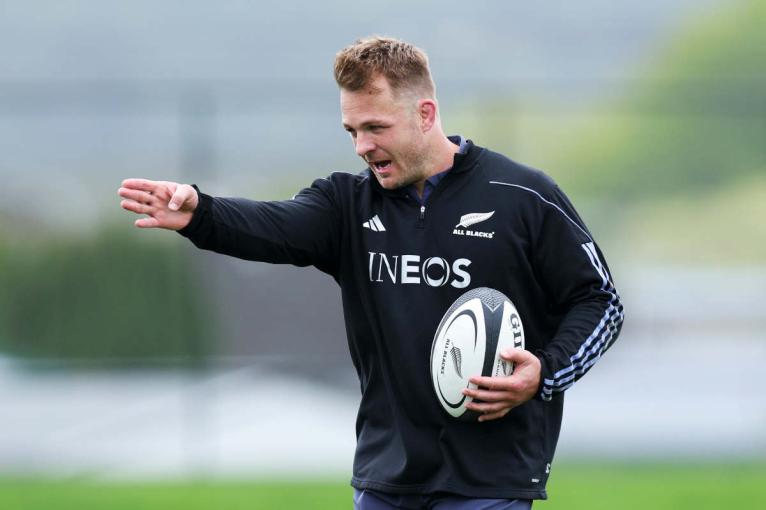 Robertson values Sam Cane’s leadership and influence on and off the field (Photo Hagen Hopkins/Getty Images)
Robertson values Sam Cane’s leadership and influence on and off the field (Photo Hagen Hopkins/Getty Images)
It’s hard to knock the logic or arguments made, but the decision to err heavily on the side of caution in assembling the squad illustrates just how focused Robertson is on winning and his level of nervousness about being able to do so.
This is in stark contrast to most of his predecessors, who have used the end-of-season tour to phase out a few long-servers by leaving them at home.
Typically, certainly in the Graham Henry and Steve Hansen eras at least, the All Blacks would head to Europe full of optimism about their chances to win over there.
The 2024 All Blacks contain no new faces and no apprentices, and they are travelling to the Northern Hemisphere with not a hint of the coaches having even half an eye on 2025.
In the first two decades of the millennium the All Blacks had so much confidence about beating the likes of Ireland, England and France that they would usually inject a few surprise choices into the tour party.
The November sojourn north was always seen as a soft entry point to introduce new caps. Kieran Read won his first caps on the 2008 end-of-year tour having been overlooked for the Tri-Nations.
In 2009, Ben Smith came into the squad as an unheralded fullback-cum-wing. In 2013 Ardie Savea travelled to Japan, UK, France and Ireland as an apprentice, something Jordie Barrett did in 2016 – on the same tour that his brother Scott was also called up as a full member and made his debut against Ireland in Chicago.
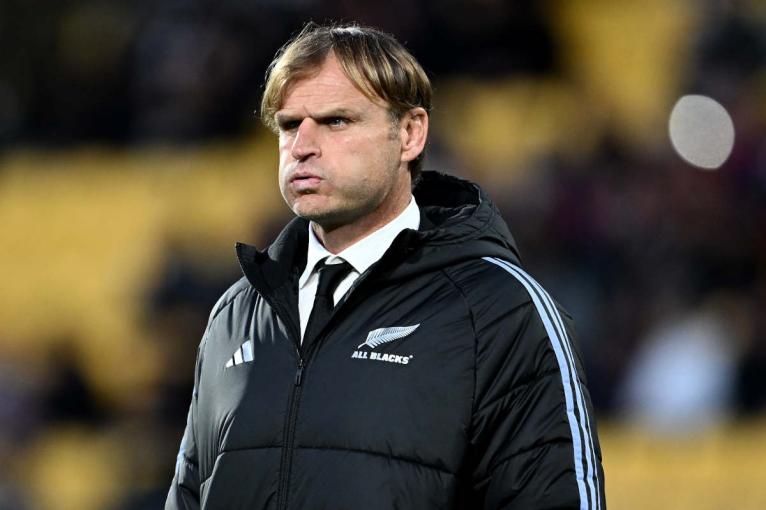 Scott Robertson has won six of his first nine Tests in charge (Photo Hannah Peters/Getty Images)
Scott Robertson has won six of his first nine Tests in charge (Photo Hannah Peters/Getty Images)
But the 2024 All Blacks contain no new faces and no apprentices, and they are travelling to the Northern Hemisphere with not a hint of the coaches having even half an eye on 2025.
This is primarily because of three things. Firstly, there is an All Blacks XV tour that will run concurrently with the All Blacks’ tour – providing opportunity for the next generation with games against Munster and Georgia.
Robertson had a guiding hand in picking that team and he’s also going to create opportunity for the likes of Peter Lakai to stay on in Europe and train with the All Blacks.
In Henry’s tenure, the All Blacks didn’t lose a single November Test between 2004 and 2011.
His argument is that it makes more sense for someone such as Hotham to play for the All Blacks XV than be with the All Blacks, where he will see limited, if any, game time.
Secondly, the whole tone and nature of the November touring window has dramatically changed in the last six or seven years due to the rise and rise of the Northern Hemisphere.
In Henry’s tenure, the All Blacks didn’t lose a single November Test between 2004 and 2011. When Hansen took over in 2012, the All Blacks lost a fixture to England, which was the first time New Zealand had been beaten in November/December for 10 years.
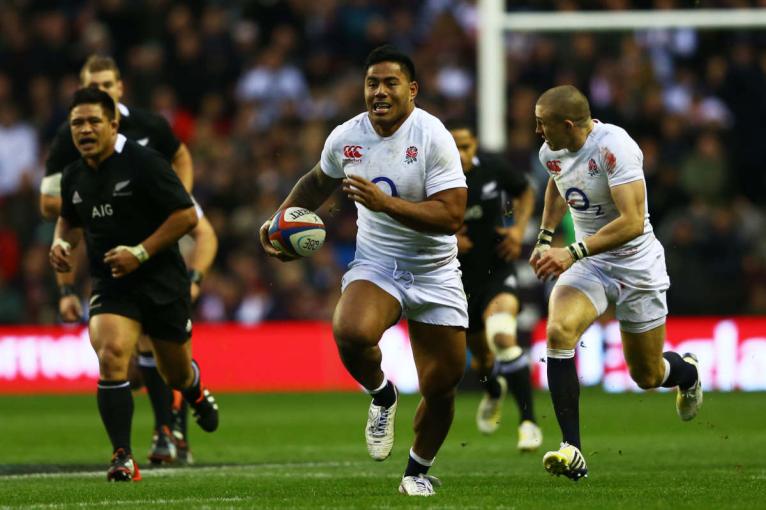 England’s 38-21 win on 1 December 2012 – with Manu Tuilagi to the fore – was New Zealand’s first defeat on a northern tour for a decade (Photo Matthew Lewis – The RFU Collection via Getty Images)
England’s 38-21 win on 1 December 2012 – with Manu Tuilagi to the fore – was New Zealand’s first defeat on a northern tour for a decade (Photo Matthew Lewis – The RFU Collection via Getty Images)
Hansen’s All Blacks would lose two more – both to Ireland – in 2016 and 2018, but their record was still an incredible played 27, won 24 against Six Nations opposition in November.
But a trip to Europe is not the soft touch it once was. The All Blacks only made it there twice under Ian Foster because of Covid and they lost two of four in 2021 – to Ireland and France – and drew with England in 2022 after beating Wales and Scotland.
Playing England, Ireland and France in consecutive weeks is arguably a much tougher gig than having to go back-to-back against the Springboks in South Africa, as the All Blacks did in August, and Robertson has understandably concluded that the November window is no longer necessarily the right place to bring a few uncapped players and give them their chance to make a name for themselves.
The All Blacks have already lost three of nine Tests on Robertson’s watch – a record that leaves him in vulnerable territory in comparison with other first-year coaches.
Ultimately, the real reason Robertson has loaded his squad with veterans, whom he thinks will know how to dig the All Blacks out of tough spots in tough venues, is that he can’t afford the defeats to continue to pile up.
The All Blacks have already lost three of nine Tests on Robertson’s watch – a record that leaves him in vulnerable territory in comparison with other first-year coaches.
Henry, for example, won 10 of 12 in his first year, Hansen 12 of 14 with a draw and John Hart 12 of 13 in 1996. These are the sorts of numbers Robertson needs to produce to get in line with the most successful of his peers. Even if the All Blacks win all five of their tour fixtures, the best they can finish with is a 78.6 per cent win ratio.
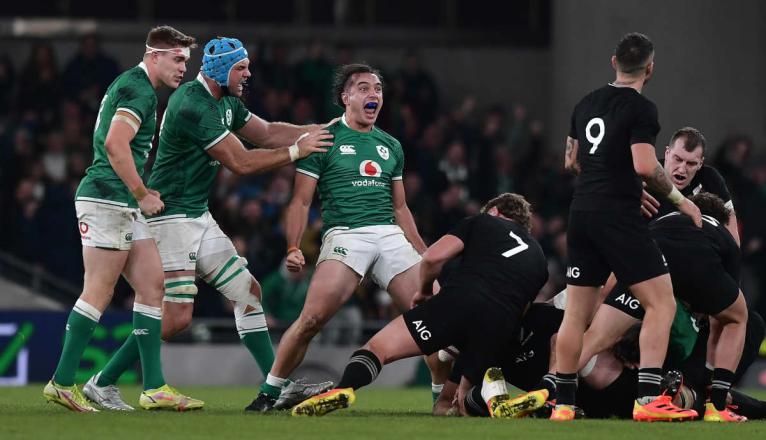 New Zealand have lost five of their last nine Tests with Ireland, including on their last two visits to Dublin (Photo Charles McQuillan/Getty Images)
New Zealand have lost five of their last nine Tests with Ireland, including on their last two visits to Dublin (Photo Charles McQuillan/Getty Images)
That number will be 71 per cent if the All Blacks drop just one game on tour; it will be 64 per cent if they drop two, and it will be 57 per cent if they lose three.
To put this into some kind of perspective, in 2009 when the All Blacks finished with 10 wins from 14, it was treated as a catastrophe. Hansen, who was then an assistant coach, had to be shuffled from his role with the forwards to lead the attack such was the pressure for NZR to be seen to be doing something to change the team’s trajectory.
In 2021, the All Blacks won 80 per cent of their Tests, which included retaining the Rugby Championship and beating South Africa, but it was rated by media outlets as a four out of 10 season.
And in 2022, when the All Blacks finished with nine wins and a draw from 14 tests, two assistant coaches lost their jobs while head coach Ian Foster only just clung on to his.
Robertson knows he’s got to produce victories in Europe more than he does next generation players. Hence his decision to rely not only on those older, experienced types who have played in London, Dublin and Paris before, but also the entirety of the squad who have been with him all season.
Every Test match is critical. Every time we play one of these games it’s the biggest game in the year for all these teams.
Continuity, he says, is critical and he clearly feels that the team is finally building something having produced their most convincing performance of the season to beat Australia in their last Test.
“As we know, as I’ve said before, everything is new,” Robertson said in why he’s made so few changes. “The squad and the members that have been in know our Test week, they know how it works.
“Cohesion is really important as we go north. All those combinations and relationships count. We’ve kept a tried combination.
“Every Test match is critical. Every time we play one of these games it’s the biggest game in the year for all these teams. The northern tour is critical for us. We want to keep our momentum going.”
[ad_2]
Copyright for syndicated content belongs to the linked Source link


